|
|
|
Sort Order |
|
|
|
Items / Page
|
|
|
|
|
|
|
| Srl | Item |
| 1 |
ID:
126511
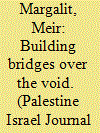

|
|
|
|
|
| Publication |
2012.
|
| Summary/Abstract |
After more than 45 years of occupation, the impact of nonviolent movements on Israeli society is still difficult to assess, and therefore their effectiveness is difficult to evaluate. The failure of all efforts aimed at ending the occupation is now clearer than ever, although, and this is remarkable, the fight against the system supporting this status quo has never declined. Despite this tireless activism, it remains unclear whether these nonviolent efforts have meaningfully contributed to peace or whether they have proved largely irrelevant to domestic and regional policies.
Not only do we lack convincing answers, but the answers we do have also differ depending on external circumstances. In bleak times, as during the Second Lebanon War, Operation Cast Lead and both intifadas, activist movements often feel useless. In contrast, during more encouraging times, such as the immediate aftermath of U.S. President Barack Obama's election, the feelings tend to be more positive and optimistic. This may be a defining issue among dissidents in Israel: shifting views without knowing what tomorrow has in store for them, going against the current within an uncertain environment.
|
|
|
|
|
|
|
|
|
|
|
|
|
|
|
|
| 2 |
ID:
126900
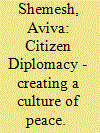

|
|
|
|
|
| Publication |
2012.
|
| Summary/Abstract |
Following the signing of the Oslo Accords and later the many disappointments arising from politicians, a movement of citizen diplomats has emerged with the intention to change reality and facts on the ground. This movement is manifested through different people-to-people a human face to the Other and, hopefully, generate sufficient momentum and pressure from below to bring about the long-overdue political will to move forward a peace agreement.
|
|
|
|
|
|
|
|
|
|
|
|
|
|
|
|
| 3 |
ID:
126902
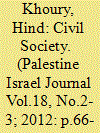

|
|
|
|
|
| Publication |
2012.
|
| Summary/Abstract |
If we contrast the era of the Arab Spring with the continuation of the prolonged Israeli occupation of the Palestinian territories and a futile peace process, now more than ever, we need a civil society that is able to mobilize the political, social, economic, cultural and human potential of our societies for social change. For it is only through a truly democratic, informed and mobilized public that we can finally overcome a culture of war, human suffering and the tenacious lack among some of the main actors of a true political will for real, just and sustainable peace.
|
|
|
|
|
|
|
|
|
|
|
|
|
|
|
|
| 4 |
ID:
126448
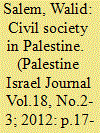

|
|
|
|
|
| Publication |
2012.
|
| Summary/Abstract |
It was as a precursor to the establishment of the Palestinian Authority (PA) in May 1994, when the prospect of state-building entered the political horizon, that the concept of "civil society" became part of the research discourse in Palestine. Questions were posed about economic issues, the proposed structure of the national authority and the feasibility of building a democratic state out of an occupied land. Many feared that the new authority would lean toward authoritarianism rather than democracy - and therefore hoped to find in civil society both a balance for the power of the state and a means of redistributing power. They hoped that civil society would indeed turn out to be, in the words of Palestinian academic George Giacaman, "that societal sphere, in which the individual plays the role of a social actor through the society organizations and in relative separation from the state" (Giacaman, 1995, p.108). This article will consider what it means to discuss Palestinian civil society, trace its historical development, and review the challenges it has faced since 2007 after the political division of the West Bank and Gaza.
|
|
|
|
|
|
|
|
|
|
|
|
|
|
|
|
| 5 |
ID:
126940
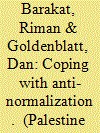

|
|
|
|
|
| Publication |
2012.
|
| Summary/Abstract |
The issue of anti-normalization has been attracting the attention of a growing number of Palestine activists. In recent months, several joint Israeli and Palestine activities have been targeted and disrupted by “anti-normalization” protesters. The issue has provoked concern among Israeli NGOs and international donors alike- the former being involved in a range of joint Israel-Palestine activities, and the latter funding those activities. The positions of Palestine NGOs are mixed. While some groups engage with Israelis in a tacit and low-profile manner, others have ended their involvement in joint activities altogether, regardless of the nature and purpose of the joint effort. Other Palestinian activists welcome joint nonviolent resistance to the occupation as in the cases of the solidarity campaigns in Sheikh Jarrah, Budrus, Ni'Lin, Bil'in, Nabi Saleh, Kufer Qadem and more. It should be also noted that there is a general exhaustion on the Palestine side, which has nothing to do with attitudes toward Israeli-Palestine dialogue and joint activity. The general sentiment among Palestine is that they should direct their energy toward developing Palestine institution and society and achieve a certain level of equality on all level before engaging with Israelis.
|
|
|
|
|
|
|
|
|
|
|
|
|
|
|
|
| 6 |
ID:
126436
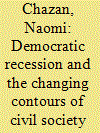

|
|
|
|
|
| Publication |
2012.
|
| Summary/Abstract |
Civil society in Israel has emerged not only as the key victim of the democratic recession currently engulfing the country, but also as the main source of its democratic promise. There is a direct correlation between the intensified efforts of neo-nationalist groups to curtail civil society and its increased centrality as the locus of the ongoing struggle for the assurance of a just, egalitarian and pluralistic Israel.
This essay briefly surveys the emergence of civil society in Israel and its characteristics; it then analyzes recent attacks on civil society organizations and consequent shifts in its structure and activities. On this basis it discusses some of the implications of Israel's present democratic crisis and seeks to reassess the outlook for democratic durability in the country. The main contention of this analysis is that there is a close connection between the vibrancy of Israeli civil society and its democratic resilience. Today, Israel's reactivated civic sector stands as the last bastion between an ultra-nationalist takeover and democratic survival.
|
|
|
|
|
|
|
|
|
|
|
|
|
|
|
|
| 7 |
ID:
126893
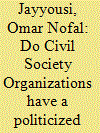

|
|
|
|
|
| Publication |
2012.
|
| Summary/Abstract |
Civil Society organization (CSOs) had an honorable history during World Wars I and II, but their role came into focus during WW II, firstly because of the size of the disaster and secondly because of the dramatic changes that took place in the French and British empires.
The most outstanding example of the importance of the role played by CSOs is the Swiss Red Cross, one of the most meaningful such organization throughout the history of nations.
|
|
|
|
|
|
|
|
|
|
|
|
|
|
|
|
| 8 |
ID:
126878


|
|
|
|
|
| Publication |
2012.
|
| Summary/Abstract |
People-to-people peace-building efforts have always been a crucial, though insufficient, stepping stone on the way to Israeli-Palestinian peace. Yet since the year 2000 the region has suffered a series of fatal blows that have created substantial psychological barriers between the two peoples, posing major challenges to grassroots peace efforts. Most recently, new internal challenges are standing in the way of people-to-people peace-building activities. While Israeli non-governmental organizations (NGOs) are suffering from delegitimization by right-wing parties, Palestinians are being pressured not to cooperate with Israelis, even in peace-building activities. Despite these alarming phenomena, NGOs and activists continue to work on both sides to lay the groundwork for Israeli-Palestinian peace.
|
|
|
|
|
|
|
|
|
|
|
|
|
|
|
|
| 9 |
ID:
126497
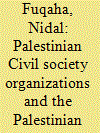

|
|
|
|
|
| Publication |
2012.
|
| Summary/Abstract |
The 1990s saw a distinct increase in the number of Palestinian non-governmental organizations (NGOs) and a widening of their scope of work and services. This increase came about as a natural result of the political environment that prevailed during in the initiation of the peace process at the beginning of the '90s and a widening of freedoms within the occupied Palestine territories. This encouraged many individuals and groups to gather under the umbrella of what are called NGOs or civil society organization (CSOs). Official Palestine statistical produces by authorities that issue licenses for these organization indicate that their number is in excess of 5,000 (as of the end of 2011), including charitable societies, centers, Clubs and unions.
|
|
|
|
|
|
|
|
|
|
|
|
|
|
|
|
| 10 |
ID:
126942


|
|
|
|
|
| Publication |
2012.
|
| Summary/Abstract |
It would be foolish to assume that "peace" has been fully embedded in Northern Ireland following 30 years of conflict and more than a decade of implementing the Agreement of 1998. There remains is Belfast, for example, more than 80 "peace walls"- a euphemism for barriers to prevent sectarian confrontation; dissident republican activity has still not been fully contained; many from the Protestant working class feel that their community has missed out on an alleged peace dividend; and the habits of conflict endure in many communities. Northern Ireland continues to be a divided society, and it remains to be proven that a strategy for societal-level reconciliation has been put in place. In particular, one of the recurring debates is concerned with dealing effectively with the past, and it is patently obvious that there is no consensus on how the wounds and traumas of the past are to be addressed.
|
|
|
|
|
|
|
|
|
|
|
|
|
|
|
|
| 11 |
ID:
126950
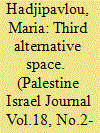

|
|
|
|
|
| Publication |
2012.
|
| Summary/Abstract |
In deeply divided societies, where barbed wire and police checkpoints prohibit freedom of movement of both ideas and goal, there exists a suitable environmental for reinforcement of a culture of conflict, mistrust and suspicion as well as a flourishing of "enemy images". According to the Enemy System Theory (Volkan, 1978, 1990; Montville, 1990; Mack, 1990), humans have a deeply rooted psychological need to dichotomize and to create enemies and allies. This phenomenon occurs at the individual as well as group level, where by primitive and unconscious impulses are mobilized and often result in the former neighbors harming and killing each other simply because they belong to different national ethnic group.
|
|
|
|
|
|
|
|
|
|
|
|
|
|
|
|
| 12 |
ID:
126904
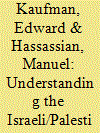

|
|
|
|
|
| Publication |
2012.
|
| Summary/Abstract |
Looking back at nearly two decades of joint classroom experience, we have developed a 15-point approach to team-teaching our conflict. While presentation of an antagonistic black-and-white picture might sharpen readers' grasp of the differences that divide us, it does not highlight the common ground, an understanding of which, we hope, will move readers not only to understand the Israeli-Palestinian conflict but also to consider alternative solutions. Briefly, our "rules of engagement" are as follows
|
|
|
|
|
|
|
|
|
|
|
|
|
|
|
|
| 13 |
ID:
126460
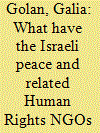

|
|
|
|
|
| Publication |
2012.
|
| Summary/Abstract |
The activities and accusation of the right-wing government and civil society group against Israeli peace and related human rights groups suggest real concern over the power and efficiency of these groups. This is ironic given the fact that these groups are weaker today than perhaps ever before, despairing of the loss or apathy of former adherents, and cognizant of the failure to achieve their objective. The occupation continues unabated; settlements continue to multiply; the word "peace", much less the chance for peace seems to have disappeared; and Israel has an extreme right-wing, Xenophobic, indeed racist government supported by a majority of the public.
|
|
|
|
|
|
|
|
|
|
|
|
|
|
|
|
| 14 |
ID:
126923
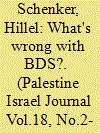

|
|
|
|
|
| Publication |
2012.
|
| Summary/Abstract |
As we marked the 45th anniversary of the occupation this June, I would support any effective nonviolent strategy that will end the occupation of the West Bank and lead to the establishment of a viable Palestinian state in the West Bank, Gaza and East Jerusalem, with mutually agreed-upon land swaps - what is known as a two-state solution based on the 1967 borders - which I believe is in the genuine interest of both the Israeli and the Palestinian peoples.
If BDS (Boycott, Divestment and Sanctions), clearly a nonviolent tactic, could produce such a result, I would support it. To borrow Shakespeare's formulation, "To BDS or not to BDS, that is the question." To my mind, the primary problem with BDS is that it won't work. It will not produce the desired result of ending the occupation.
|
|
|
|
|
|
|
|
|
|
|
|
|
|
|
|
|
|
|
|
|